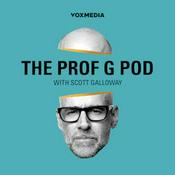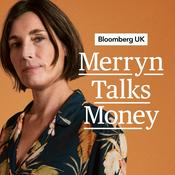17 episodes

Matthew Prince (Co-founder & CEO of Cloudflare)
24/9/2025 | 1h 14 mins.
In this episode of The Slow Hunch, I spoke with Matthew Prince, the co-founder and CEO of Cloudflare. Since 2010, Matthew and his team have built Cloudflare into one of the most important companies on the internet: powering and protecting vast portions of global traffic. Our conversation explores the through-line from Matthew’s initial hunch about fixing the flaws of the early internet, to Cloudflare’s present role as a foundational infrastructure provider. We talk about the early experiments and risks that have shaped Cloudflare’s culture, and how those small bets compounded into a truly iconic company today. Matthew shares stories from the company’s pre-IPO days, the decision to make encryption free, and how Cloudflare’s infrastructure ended up running two of the internet’s thirteen root servers. Toward the end, we dive deep into the transition from a search-driven internet to an answer-driven one, and what that means for publishers, creators, and the future business model of the web.It was especially fun to record this one with Matthew, who I’ve known since USV’s investment in Cloudflare’s Series C back in 2013. Hope you enjoy!Chapters00:00:00 Curiosity vs. focus; small bets culture00:02:44 Pre-IPO mock earnings calls & learning to take hard questions00:04:48 Matthew’s slow hunch00:05:54 The Unspam origin story: legal mindset meets early internet problems00:11:16 Passing trademark legislation in Utah00:13:39 Meeting Lee (via Arthur Keller)00:18:00 Lee moves to Utah; building from a basement00:20:02 From Unspam to Cloudflare00:20:25 Enter Michelle00:28:19 Realizing how critical Clouflare’s role was (the 2017 outage)00:29:07 Conducting experiments at scale: how small bets can become big lines of business00:31:44 Making encryption free00:33:26 From brittle deploys to Workers00:36:00 Cost curve obsession & why lowest cost to serve always wins00:38:00 Running 2 of the 13 internet root servers00:41:31 Pakistan Telecom story: local demand opens networks00:43:32 Principled decisions > spreadsheets00:44:40 Shift from search engines to answer engines00:48:00 Longing for a quirkier web00:52:56 Incentivizing creators to fill LLM knowledge gaps00:56:05 Designing an open, fair market (price by scale/MAU, not tokens)01:01:15 Scarcity switch flips; next-gen models hit a plateau01:04:00 Google’s role: should AI overviews fund creators?01:06:35 GPUs & researchers commoditize; content becomes the moat01:09:00 Reddit vs. NYT: the value of original/local/quirky content01:10:49 Toward a golden age of content (less rage, more knowledge)01:13:17 Counterintuitive optimism for human-made content

Alex Komoroske (Common Tools)
10/9/2025 | 1h 13 mins.
In this episode of The Slow Hunch, I spoke with Alex Komoroske, the co-founder and CEO of Common Tools. Alex has spent his career thinking about how individual incentives can add up to significant collective outcomes. Before starting Common Tools, he spent more than a decade at Google leading product management for the Chrome web platform, ambient computing, AR, and Search, and later served as Head of Corporate Strategy at Stripe.We traced his slow (emergent) hunch from an early fascination with Wikipedia, through his years building internet-scale systems at Google, to his current work rethinking how AI is architected.A big part of our conversation centered on emergence: why the most durable systems grow from the bottom up, and what that means for product design, org culture, and the future of technology - especially AI. We also spoke about the hidden security risks in today’s AI ecosystem: why “chat” may not be the defining paradigm for complex work, how fusing data to apps risks locking us into an AI monoculture, and why policies should travel with data if we want healthier emergent effects.It’s always fun catching up with Alex. Hope you enjoy!Chapters:00:00:00 Cold open: the inevitability of transformers00:03:32 Why emergence is so powerful00:08:49 Alex’s early influences 00:10:35 The emergent dynamics of Wikipedia00:13:15 The role of “folksonomies”00:17:33 Concave systems vs convex systems00:20:41 Alex’s time at Google00:24:27 How small signals scale00:28:58 Evolutionary algorithms in AI00:30:52 Understanding data bias and rethinking how AI is architected00:41:02 The same-origin trap and the limits of app-centric software00:47:42 The future of contextual apps00:49:03 Aggregators and the tyranny of the marginal user00:52:08 Why prompt injection is so dangerous00:55:23 The inherent security risks of MCP and vibe coding00:59:32 A new constitution for AI: policies attached to data01:03:17 The promise of confidential compute01:11:00 Why Alex is optimistic about AI's Future

MC Lader & Marvin Ammori (Uniswap)
27/8/2025 | 1h 8 mins.
In this episode of The Slow Hunch, I spoke with MC Lader and Marvin Ammori, who spent four years together helping build Uniswap into one of the most important companies in decentralized finance. MC was President and COO; Marvin served as Chief Legal Officer after a long career as one of the internet’s leading policy lawyers.We traced their shared slow hunch that technology can shift power: first through the open internet, and later through open financial systems.We also spoke about the parallels between the net neutrality battles of the 2000s and the present-day struggle over how crypto is regulated, the challenge of building in the face of policy headwinds, and why stablecoins, programmable markets, and open protocols are placed to be the next rails for global finance.This was a fun conversation, recorded at a moment when the policy climate for crypto is starting to thaw. Hope you enjoy!Chapters:00:00:00 Cold open - policy headwinds under Gary Gensler00:05:50 Their shared slow hunch: technology as a force for redistributing power00:14:47 Winning the net neutrality fight00:18:36 First encounters with Bitcoin00:21:14 Parallels between the open internet and DeF00:22:58 Spotting early policy threats and forming the DeFi Education Fund00:23:34 Marvin recruits MC to Uniswap Labs00:29:27 Scaling Uniswap from a tiny team to a full-stack protocol00:34:36 Navigating growth amid SEC opposition00:39:11 Gary Gensler’s impact on US crypto entrepreneurship00:40:45 Stablecoins as the “lily pad” for mainstream adoption00:43:20 Shifting perceptions on Wall Street00:46:12 What’s next: stablecoins, tokenized markets, and on-chain identity00:47:00 Building open, permissionless financial infrastructure00:51:52 Potential risks: fraud, systemic stability, surveillance00:55:45 Stablecoins vs. the fragility of traditional banks00:57:53 Privacy, regulation, and zero-knowledge proofs01:00:00 From DeFi to AllFi: what moves on-chain first?01:04:11 Building for consumers versus institutions01:06:03 Making money feel more human01:08:49 Access to capital as a pillar of opportunity

Dan Romero & Varun Srinivasan (Co-founders of Farcaster)
06/8/2025 | 1h 17 mins.
In this episode of The Slow Hunch, I spoke with Dan Romero and Varun Srinivasan, the co-founders of Farcaster. Farcaster is a social app and protocol that is open, programmable, and crypto-native. Before starting Farcaster, both Dan and Varun spent a few years at Coinbase. That experience deeply shaped their perspective on crypto infrastructure, user behavior, and what it takes to build a “sufficiently decentralized” experience at scale.In this conversation we trace their slow hunch: the idea that social networks needed to be rebuilt from the ground up, as decentralized protocols with credible neutrality, shared state, and a design space open to builders. We talked about what they got wrong early on (too much focus on architecture, not enough on user acquisition), how crypto enables new interaction primitives like tipping and token-based identity, and why open programmability (not just ideology) is Farcaster’s biggest edge.Hope you enjoy!Chapters: 00:00:00 Cold open00:02:20 What makes Farcaster different00:06:45 Early crypto days at Coinbase00:10:30 Discovering a shared vision for decentralized protocols00:16:07 Why the infrastructure is ready now00:20:55 The social landscape in 2020: Twitter, Mastodon, Bluesky00:23:00 Elon acquires Twitter, FTX, and the narrative shift in decentralized social00:24:53 Designing for "sufficient decentralization"00:29:26 Why the obsession over pure decentralization is a distraction00:32:05 The Farcaster launch story - how they got their first users00:34:30 Why social protocols take time to grow00:36:28 Inventing new content primitives instead of choosing political sides00:41:00 What crypto rails enable: Wallets, tipping, and programmable social UX00:42:38 Reframing money as social interaction00:43:56 Why crypto feels contrarian00:45:59 Crypto as the last frontier of indie building00:47:01 AI vs crypto as platforms for small creators00:49:40 Hiding vs embracing crypto in UX00:50:55 Dan and Varun’s evolving view on abstracting away the chain00:54:00 The adjacent possible: mini-apps, embedded wallets, AI video00:59:00 Using AI to surface context + trending content01:00:54 What big platforms won’t do: programmable money01:03:57 Crowdsourced Q&A – early Farcaster days01:06:53 Why mobile UX is everything01:07:00 The surprising difficulty of building other clients01:08:43 Varun on shifting from text to video01:13:00 Why they cut encrypted messaging01:15:00 Closing thoughts

Ben Leventhal (Founder & CEO, Blackbird)
09/7/2025 | 1h 7 mins.
In this episode of The Slow Hunch, I spoke with Ben Leventhal, the founder and CEO of Blackbird. Ben has spent the past two decades reimagining the restaurant industry, having previously co-founded Eater and Resy. The throughline that connects his efforts is a strong belief that restaurants are universally loved but fundamentally broken businesses—and that there must be a better way to run what is a trillion dollar industry in the United States alone. We talked about what’s gone wrong with the restaurant business model, why most restaurants struggle to turn a profit despite enormous consumer love, and how each of Ben’s ventures has tried to close that gap—first with content (Eater), then with mobile (Resy), and now with crypto (Blackbird). Through Blackbird, Ben is using crypto rails to build a restaurant-native platform currency: one that rewards regulars, strengthens margins, and builds more intimate ties between diners and the places they love.We recorded this conversation in my apartment in New York, just around the corner from a restaurant I paid for using Fly, Blackbird’s currency. Few founders have followed a hunch as consistently and creatively as Ben. Hope you enjoy!Chapters:00:00:00 Cold open: why restaurants are broken00:01:10 Introducing Ben Leventhal00:02:00 Ben’s slow hunch: the status quo is always wrong00:05:00 Falling in love with restaurants as a kid00:08:00 She Loves New York: the proto-Eater newsletter00:10:30 Early blogging and New York’s indie media scene00:14:00 Starting Eater with Lockhart Steele00:16:00 Eater as “sports coverage” for restaurants00:18:00 Why restaurateurs initially hated Eater00:20:30 Scooping the New York Times00:22:00 The adjacent possible and building with new tools00:24:30 Leaving Eater and exploring new projects00:25:50 The Resy origin story00:27:30 Resy’s mobile-first wedge: outdoor seating and Notify00:31:00 Selling Resy to Amex00:33:00 Why Resy was restaurant-first (and OpenTable wasn’t)00:38:00 The COVID reset: restaurants become brands00:45:00 The idea for Blackbird takes shape00:52:00 Introducing Fly: a platform currency for restaurants00:56:00 How Fly helps restaurants recapture value01:00:00 Restaurant regulars as shareholders01:03:00 Designing Blackbird to feel like a consumer app01:04:00 What’s next: AI and the future of restaurant marketing
More Business podcasts
Trending Business podcasts
About The Slow Hunch
Listen to The Slow Hunch, Money Talks and many other podcasts from around the world with the radio.net app

Get the free radio.net app
- Stations and podcasts to bookmark
- Stream via Wi-Fi or Bluetooth
- Supports Carplay & Android Auto
- Many other app features
Get the free radio.net app
- Stations and podcasts to bookmark
- Stream via Wi-Fi or Bluetooth
- Supports Carplay & Android Auto
- Many other app features


The Slow Hunch
download the app,
start listening.





































